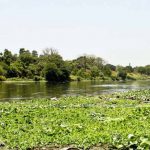What is this WED?
World Environment Day (WED) focuses attention on important environmental issues and it is one of the principal vehicles through which the United Nations has been stimulating worldwide awareness of the environment and enhancing political attention and action since 1973 every 5th of June.
Last year, World Environment Day was one of the top 10 most tweeted topics on the Twitterverse.
This year, make your voice heard together with the millions who will show their solidarity for the islands, climate change and the environment.
On 4th June and 5th June 2014 log on to your Twitter account and schedule some messages to be sent between 48 hours. You just have to remember to include #WorldEnvironmentDay or #WED2014
If you don ́t have a Twitter account, maybe today’s the perfect day to open one!
“Stockholm was without a doubt the landmark event in the growth of international environmentalism”, writes John McCormick in the book Reclaiming Paradise.
“It was the first occasion on which the political, social and economic problems of the global environment were discussed at an intergovernmental forum with a view to actually taking corrective action.”
On this world environment day it is a good idea to take stock of the damage human beings around the globe have brought upon the environment. According to concerned people of the planet seven of the most pressing environmental threats facing all humanity include:
Climate change is a real problem. Even small temperature changes are causing crops to die, decreasing the amount of food available. Higher temperatures are causing the polar icecaps to melt, flooding certain areas and leading to an imbalance for wildlife.
The question is what are you going to do about this?
You can begin by showing your concern for environment by taking small steps like using less electricity by turning off your lights when you don’t need them, driving less, switching to LED bulbs and eating less meat.
Deforestation is next. Trees are being uprooted at an alarming rate. This mean less trees, less oxygen in life and the displacement of wildlife. Removing trees also leads to much drier climates, as trees extract groundwater to release into the air. Humans have already chopped down about 50 percent of rain forests.
But deforestation is something that we individuals can combat. Use recycled paper and hug trees when an intruder wants to chop it down.
Pollution comes in many forms and the main reason for why pollution is so out of control is because of our greed for more of everything. This need for manufactured items also leads to the air and water pollution emitted from factories, which in many countries are highly unregulated.
The first thing to do to reduce pollution on streets, air and water is to make a mental change. Before buying a new product, ask if you really need it. If each one of us does this the world is bound to change.
A loss in biodiversity is having a catastrophic effect on us. A drastic decline in the population of bees has a direct effect on both the environment and food production. Many other animals are in danger of becoming extinct from being forced out of their habitats by man or by climate change.
This problem is closely linked to deforestation and unchecked habitat destruction, two issues that can also slow down loss of biodiversity.
Melting polar ice-caps cause rising sea levels. And when ice melts all the water goes into the oceans that swallow up good land.
Oceanic dead zones along the coasts are due to depleted oxygen levels that cannot support marine life. The good news is that dead zones can be reversed, though it is difficult. For example the Black Sea dead zone disappeared between 1991 and 2001 due to discontinued use of fertilizers.
Explosive population growth is straining water, food, well-being, space and sanity and we all know how that problem can be solved!
What you can do is to talk to people around you about making smarter choices about parenthood and consumption habits.




